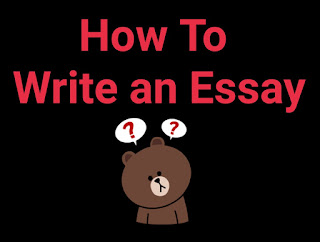HOW TO WRITE AN ESSAY
I'm giving you some useful hints on essay writing. We will discuss these under the following heads:
1. Planning the Essay
2. The format of the Essay
3. The various kinds of Essay
1. PLANNING OF THE ESSAY
Planning is necessary whenever we write anything, even if it is a letter. Since an essay is a formal composition, it needs still more careful planning. Now, taking an essay topic purely from the examination point of view, the following points have to be kept in mind
□ Choose your topic carefully
There is always a choice of topics given in the question paper. Go through each topic very carefully and select the one which you think you can handle most competently. It is often said that one should not choose a topic which is easy and which practically every other student would be attempting. But if you feel that you can tackle most confidently only such a topic, you should not hesitate to do so. Don't select a topic just because it happens to be uncommon, unless you are sure of yourself.
□ Understand the nature and scope of the topic selected
Once you have selected a topic, study the key words of the title in order to find out what it really means. The title gives you the complete clue to the nature and the scope of the essay. Don't start off in a hurry. Read out the title to yourself a couple of times to ensure that you have fully understood what it stands for.
□ Prepare an outline for the essay
It is always useful to prepare an outline before you start writing the essay proper. It is worthwhile to spend a few minutes in jotting down the points that you think you should discuss in the essay. You must look at the topic from all possible angles and note down whatever points come to your mind. Do all your thinking at one stretch. You can then rearrange the points in the order in which you want to discuss them. This pre-planning helps in three ways. Firstly, when you start writing an essay without preparing any outline, you are likely to miss out some important point. Secondly, you will have to stop every now and then to think of what to write next. This will consume a lot of time. Thirdly, since ideas don't always come to our mind in a logical manner, the essay would become a mixture of haphazard, illogical, disorderly ideas and lacking unity of thought.
2. THE FORMAT OF THE ESSAY
An essay is a composition, and every composition can be divided into three parts:
(a) The introduction
(b) The body
(c) The conclusion
□ The introduction
It should be short and consist of one small paragraph. Never write a paragraph of one sentence as an introduction. You can start with an interesting statement or a quotation. Don't come immediately to the topic in hand in your introduction. Prepare a proper background for it.
□ The body
This constitutes the main part of the essay. It consists of several paragraphs, each dealing with the development of one idea and leading on to the next in a logical order.
□ The conclusion
Like the introduction, the conclusion also consists of one short paragraph. It is meant to round off the essay and to give it an air of finality.
3. THE VARIOUS KINDS OF ESSAY
Though essays may be divided into five or six kinds, for our purpose we broadly classify them into following three types:
(a) Descriptive essays
(b) Narrative essays
(c) Reflective essays
□ The descriptive essays
A descriptive essay is one in which you are asked to describe an object, a scene or a person. Such an essay should give a clear picture of the subject matter. Too much details should, however be avoided. It should also have a realistic touch about it. It must reflect powers of close observation. You have to create in your mind the picture of the object or scene and describe it vividly. If you are describing an object, think about its shape, special features and what it feels like. Pick out it parts. Describe its functions. If possible, compare the object with something else.
If it is a scene, think of its important features. The description should include colors, shapes, sounds and smells as well as the impress on it makes on you as an individual.
If it is a person, his physical features have to be described. It should be followed by an account of his character, his mannerisms, the way he talks and generally conducts himself. It should also include the effect of his personality on you.
□ The narrative essays
In such essays we are asked to narrate a story based on our own experiences or some imaginary happening. A great deal of imaginative power is needed here. We have to make the narration not only look real but interesting also. All the essential of a good story have to be present in our account. These include a plot which develops into a climax or contains some moral; characters who appear real; and an intimate personal touch. The introduction should set the sense and create the right kind of atmosphere. The body of the essay contains the climax, and the whole thing is brought to a conclusion in the end.
□ The reflective essays
Here we have such topics which demand discussion. One is required to state one's ideas and opinion on a subject which may be controversial, thought provoking, or argumentative. In such essays one must first make up one's mind as to what point of view one is going to project and plan the outline accordingly. The arguments that you advance in support of your point of view must be convincing as well as rational. But, care must be taken to keep the essay impersonal. You must not be carried away by your emotions. The introduction here should clearly state what the title means to you. The body should consist of arguments for and against. The conclusion should round up the arguments and reaffirm your personal opinion as backed by the reasoning advanced by you.



This was an awesome post. This time the admin has shared a chock full of information.
ReplyDeleteSpoken English Classes in Chennai
Spoken English Class in Chennai
Spoken English in Chennai
Best Spoken English Classes in Chennai
Best Spoken English Institute in Chennai
IELTS Coaching in Chennai
English Speaking Classes in Mumbai
Spoken English Classes in Anna Nagar
Spoken English Classes in Chennai Anna Nagar
Nice blog!! I hope you will share more info like this. I will use this for my studies and research.
ReplyDeleteAngularjs Training in Chennai
Angularjs Course in Chennai
Ethical Hacking Course in Chennai
Tally Course in Chennai
Angular8 Training in Chennai
Angularjs Training in Chennai
Angularjs Certification in Chennai
Angularjs Training in Chennai
Angularjs Course in Chennai
thanks for the information
ReplyDeleteGenius writings
Very Intriguing Blog
ReplyDeleteHomework Owls